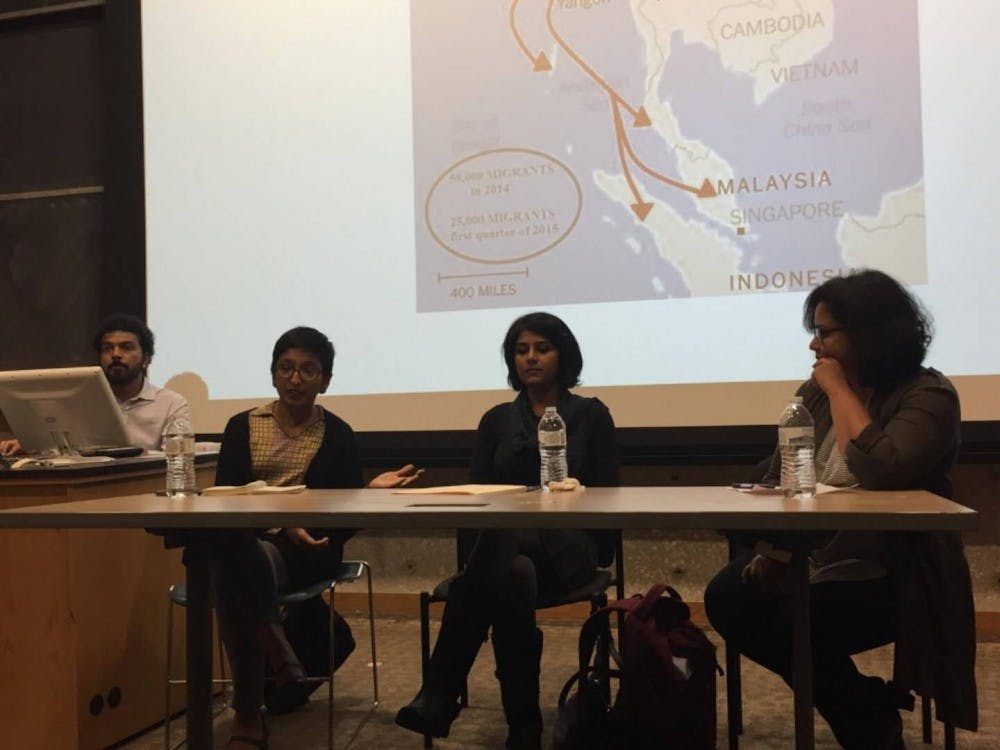Since August 2017, hundreds of thousands of Rohingya people, one of the many ethnic minorities in Myanmar (Burma), have migrated into the neighboring country of Bangladesh.
The Rohingya, which are predominantly Muslim, have fled Myanmar, a predominantly Buddhist country, to escape violence and “ethnic cleansing” imposed by the country’s security forces.
On Tuesday, three professors gathered to shed light on the historical development of the Rohingya refugee crisis, the current situation and its relevance to the rest of the world. The event, titled “A Teach-In on the Rohingya Refugee Crisis,” was hosted by the Department of Anthropology, Center for Islamic Studies, the Alexander Grass Humanities Institute and others.
The teach-in featured panelists Nusrat Chowdhury, assistant professor of anthropology at Amherst College, and Navine Murshid, associate professor of political science at Colgate University. Hopkins Associate Professor of Anthropology Naveeda Khan moderated the discussion.
To provide historical context for the crisis, Khan shared personal experiences. She graduated from college and soon began working for the United Nations Human Rights Commission for Refugees (UNHCR) in Bangladesh, where many Rohingya people were located.
“In my own awareness, there was a major influx of Rohingyas into Bangladesh. In 1991, when the Rohingya people were pushed out of Burma, Bangladesh was initially quite joyous and welcoming. And the United Nations set up camps to accommodate Rohingyas,” she said.
However, tension between the Bangladeshi and Rohingya groups began to build.
“The camps became better administered — with the refugees getting schooling and mental health care — than some of the neighboring villages where large populations of Bangladesh people lived. This weird dynamic created tension between the Rohingyas and the Bengalis, which led the Bangladesh government to push the people back to Burma,” she said.
Khan also pointed out that today, unlike in the past, the Rohingya people are often viewed as Islamic terrorists.
“These refugee camps were seen as a threat of the refugees leaving to assimilate into the Bangladesh population instead of hotbeds of Islamic terrorism, which was how the camps were portrayed in the international media,” she said.
Murshid emphasized the severity of the current situation while calling into question past media coverage on the crisis.
“The persecution of Rohingyas began in 1974, and the first wave of refugees entered Bangladesh in 1977. For the last 20 years, we have been saying that we’re living in the Information Age. However, it is only now, 40 years later, that their persecution has shocked the world,” she said.
The Bengali government has been welcoming to the Rohingya people, according to Murshid.
“Bangladesh has taken the moral high ground now. Prime Minister Sheikh Hasina says, ‘If we can feed 160 million people, we can feed another 700,000 refugees.’ She has also said that she expects no help from President Trump,” Murshid said. “In the context of the United States, where so many seem to think that refugees are burdensome, the GDP per capita in the U.S. is around 59,000, while in Bangladesh it is 1,300.”
Murshid also commented on criticism surrounding Aung San Suu Kyi, the leader of Myanmar and the 1991 Nobel Peace Prize recipient. Recently many have said that due to her government’s violence against the Rohingya people, her award should be revoked.
“Such demand speaks to how she was seen as the bastion of human rights and democratic progress,” she said. “It is worth pointing out that this was her image only in the West.”
Murshid added that Aung San Suu Kyi is perceived less positively in Myanmar than she is in the West.
“During my field work in 2008 and 2012, it was clear to me that ethnic minorities in Myanmar did not see her in a similar way,” she said. “To them, she was a Burmese nationalist. Democracy without ethnic power-sharing will not bring peace.”
Chowdhury also commented on how Islamophobia relates to the crisis.
“We always need to question whenever we hear a category like terrorism,” she said. “But the issue of Rohingyas is not reducible to contemporary Islamophobia even though it clearly aligns itself with that.”
Instead Chowdhury suggested that the crisis has much more complex historical roots.
“There has been disagreement about how long Muslims have been living there,” she said. “The year 1824, however, marked the official onset of British colonialism in that region. Colonialism comes with a huge bureaucracy that thrives on identification and the exclusion of certain identities.”
She added that a lot of Buddhist inhabitants in Bruma have interacted with Muslims and Bengalis through their relationship with colonial bureaucracy.
“This nexus among empires, migration and ethnic conflict is what we will need to keep in mind when we try to understand crises like this,” Chowdhury said.
Senior Aleena Nasir, a member of the student organization United Muslim Relief, attended the teach-in. She first learned about the Rohingya refugee crisis while interning for the U.N., where she researched ways to protect human rights in areas with a high potential for genocide.
“It’s so surprising that so many people don’t know about this issue,” she said. “It has just been really interesting to see the lack of international response, but also the response that is there remains very critical.”
She added that remaining educated about the refugee crisis is crucial for students.
“There are so many things going on. There are these questions of citizenship, democracy, economy and how we handle refugee crises in general,” she said. “As for the students, besides attending events like this, I think the main thing to do is just reading the news and staying informed.”





